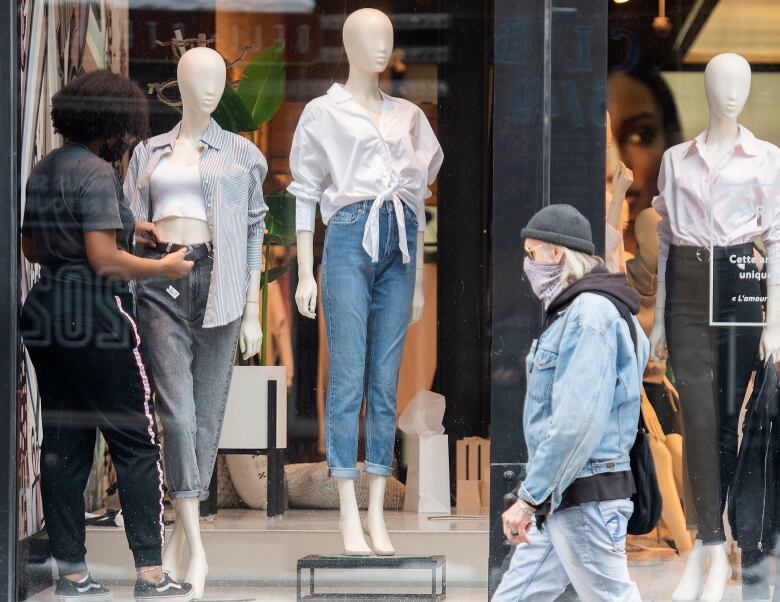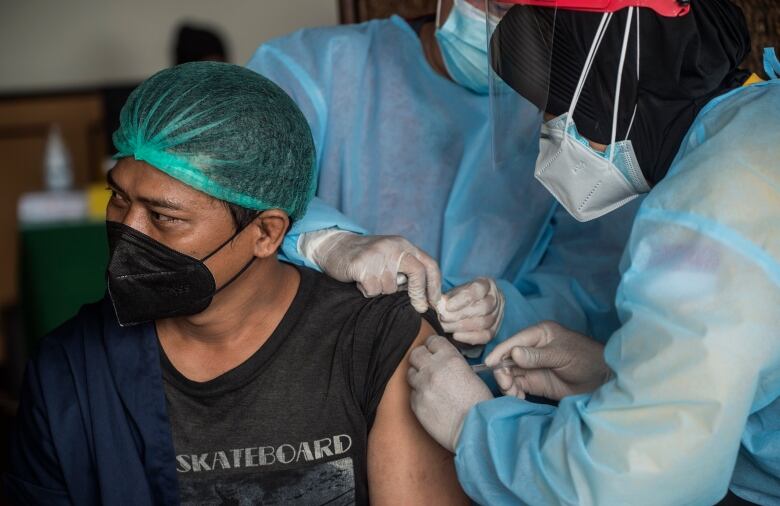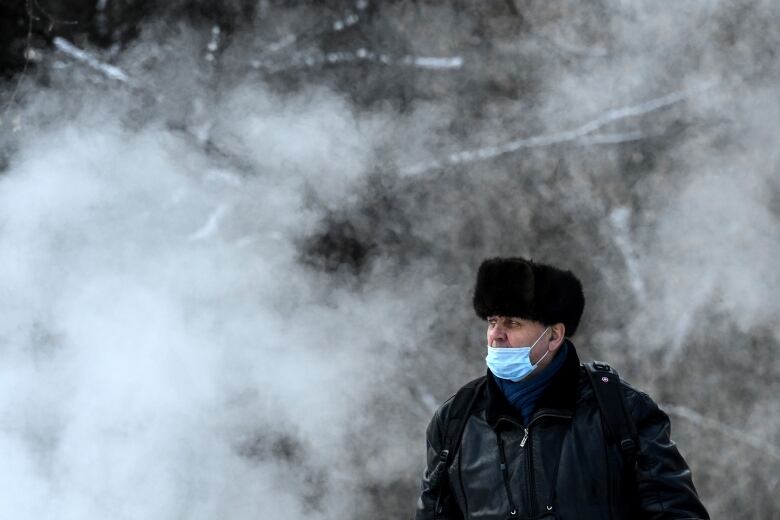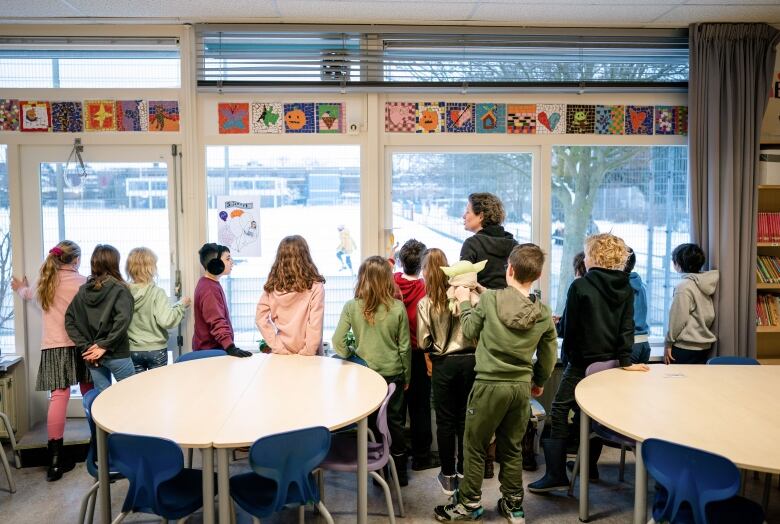Coronavirus: What's happening in Canada and around the world on Feb. 8
Ontario letting more businesses reopen, Newfoundland and Labrador reports 11 new COVID-19 cases
The latest:
- Albertareports269 new COVID-19 cases, its lowest daily figure since Oct. 17.
- Ontario will let more businesses reopen, gradually lift stay-at-home orders.
- New Brunswick loosening restrictionsin Moncton and Edmundston regions.
- Ottawa lays out criteria for quarantine hotels as it inches toward new travel rule.
- 11 new cases of COVID-19 in N.L., group recreation in St. John's area suspended.
- 10,000 lives lost:A closer look at the people behind Quebec's staggering pandemic death toll.
- Have a question about the coronavirus pandemic? Send your question to COVID@cbc.ca
People in Alberta, Quebec and Nova Scotia are seeing some COVID-19 restrictions lifted Monday, while students in more than a dozen public health regions in Ontario who had been learning remotely ventured back into the classroom.
Also Monday,the Ontario government announced it willallownon-essential retailers to reopen at limited capacity, as it laid out itsplan to gradually lift stay-at-home orders.
Three public health unitswill be the first to see the order lifted on Wednesday as they move into the least-restrictivegreen categoryof the province's colour-coded reopening framework, Premier Doug Ford announced at a briefing Monday afternoon.
Other regions are staying in the grey lockdown phase for now, but the province is making some changes to the restrictions they face.Chief among them is that non-essential retailerswill be allowed to open their doors with a 25 per cent capacity limit.
The announcement comes as Ontarioreported 1,265 new cases of COVID-19 on Monday and33 additionaldeaths, bringing the provincial death toll to6,538. Hospitalizations in the province decreased to901, with 335 people listed as being in intensive care units, according to a provincial dashboard.
Students in several regions of the province returned to in-class learning on Monday after starting 2021 remotely. Students in Hamilton and Windsor were among those heading back to school, but in three COVID-19 hot spots Toronto, Peel Region and York Region schools will remain closed to in-person learning until Feb. 16.
Meanwhile, Quebec is again allowing non-essential businesses, including personal care businesses like hair salons, to open their doors.
The province, which over the weekend surpassed 10,000 deaths since the pandemic began, is keeping a curfew in place but "red zone" communities will see their curfew start earlier than communities with fewer cases.

Restaurants and theatres are alsoallowed to open in "orange zone" communities as of Monday, though those businesses will stay closed to customers in harder-hit areas for now.
Quebec reported 853 new cases on Monday,its lowest daily case total since Oct.26, as well as 17 new deaths.
After trending down in recent days, hospitalizations saw a slight increase of six to 969, with 160in intensive care units, according to a provincial dashboard.
In Atlantic Canada,Nova Scotiais allowing retail businesses and fitness facilities to operate at 75 per cent capacity. The provinceloosenedrestrictions in a range of sectorsstartingMonday as it reportedone new case of COVID-19.
Businesses and organizations holding events likeweddings,funerals, sporting matches and festivalsin Nova Scotia will be allowed to increase the number of people in attendance,but the number of people allowed to get together informally and inside a home is holding at 10.
New Brunswickofficials also announced looser restrictions are on the way forthe Moncton and Edmundston regionsas the provincereportedtwo new caseson Monday itslowest daily number in the new yearso far.
WATCH | Finding, approving COVID-19 treatments a challenge:
Newfoundland and Labrador, however, could see some additional restrictions after health officialsreported 11 new cases of COVID-19 on Monday, its highest daily total since April 5.Health officials saidthe cases are tied to three clusters in the greater St. John's area.
Chief medical officer of health Dr. Janice Fitzgerald saidthere is evidence of community spread and urged people to be cautious.
"With community spread in our midst, we need to behave like we did in April," she said.
Meanwhile, inAlberta,restaurants are now allowed to reopen for in-person dining. Sports and entertainment-related activities can resume in schools, and youth will be able to participate in lessons and practices for team-based minor sports and athletics.
Not every restriction is rolling back, though, as indoor gatherings are still banned, and outdoor get-togethers remain capped at 10.
The loosening of restrictions comes as theprovince reported 269 new cases, its lowest daily figure since Oct. 17,andfive new deaths on Monday.
In other provincial updates,Manitoba reported53 new cases and four new deaths, while Saskatchewan reported 171 new cases andtwo new deaths.British Columbia, which does not provide updateson the weekend,reported 1,236 new cases and 13 new deaths over the past three days.
In the North, Yukon and Nunavut both reported no new cases.
As of 6:15 p.m. ET on Monday, Canada had reported 808,120cases of COVID-19 with 40,175considered active. A CBC News tally of deaths stood at 20,835.
WATCH | Minister in charge of acquiring Canada's COVID-19 vaccines says supply delays 'largely behind us':
Here's a look at what's happening across the country:
- Sask. premier says lockdowns are a 'stopgap,' won't end pandemic
- More COVID-19 vaccine headed to Manitoba as province ramps up immunization campaign
- Here's why COVID-19 numbers have dropped among B.C.'s South Asian population
- N.W.T.'s Gahcho Ku mine suspends operations as 6 new COVID-19 cases identified
- Inseparable: Eastern Ontario man takes job at seniors' home to visit mom
- Windsor Regional Hospital to start delivering 2nd Pfizer shots again this week, after delays
- From CBC News and The Canadian Press, last updated at6:15 p.m. ET
What's happening around the world

As of Monday evening, more than 106.4million cases of COVID-19 had been reported worldwide, with more than59.3 million of those cases listed as recovered or resolved by Johns Hopkins University, which maintains a case tracking tool. The global death toll stood at more than 2.3 million.
The head of the World Health Organization said Monday the emergence of new COVID-19 variants has raised questions about whether existing vaccines will work, calling it "concerning news" that the vaccines developed so far may be less effective against the variant first detected in South Africa.
Tedros Adhanom Ghebreyesus said at a media briefing that South Africa's decision on Sunday to suspend its vaccination campaign using the AstraZeneca vaccine is "a reminder that we need to do everything we can to reduce circulation of the virus with proven public health measures."
He said it was increasingly clear that vaccine manufacturers would need to tweak their existing shots to address the ongoing genetic evolution of the coronavirus, saying booster shots would most likely be necessary, especially since new variants of the virus are now spreading globally and appear likely to become the predominant strains.

South Africa,which has recorded the most coronavirus infections in Africa and more than 46,000 deaths, willstart its immunization campaign with Johnson & Johnson's vaccine in place ofAstraZeneca's.
A government fact sheet published on Monday said the J&J vaccine would be offered from mid-February. A senior health official said J&J had agreed to speed up deliveries so the first doses would become available around the end of the week.
In theAsia-Pacificregion,South Korea's daily tally of newly confirmed coronavirus cases has fallen below 300 for the first time in more than two months as authorities slightly ease tough physical distancing rules in the country.
South Korea's virus caseload has gradually slowed in recent weeks amid stringent physical distancing rules. On Monday, officials began allowing restaurants, coffee shops, indoor gyms and other facilities outside the densely populous Seoul metropolitan region to stay open an hour longer. Authorities say they'll maintain a ban on social gatherings of five or more people throughout the Lunar New Year holidays.
WATCH |COVID-19 restrictions derail Lunar New Year travel in China:
China appears to have stamped out its latest coronavirus outbreaks centred on the northeast, reporting no new cases of local infection in its latest daily report.
The National Health Commission said Monday that 14 newly confirmed cases had been brought from outside the country but no new cases were registered in the provinces of Heilongjiang and Jilin that have seen China's latest clusters. While China has relaxed some physical distancing rules, extensive testing, electronic monitoring and periodic lockdowns remain in place.
In theAmericas,Texas Republican Rep. Ron Wright, who had battled health challenges over the past year including lung cancer treatment, has died more than two weeks after contracting COVID-19, his office said Monday. He was 67.
Wright died Sunday, spokespersonMatt Langston said. He did not know the cause of death but said Wright and his wife, Susan, had been admitted to a Dallas hospital in the previous two weeks after contracting COVID-19.
In Florida, fans many of them maskless took to the streets and packed sports bars on Sunday evening as the clock inside Raymond James Stadium ticked down on a hometown Super Bowl win for the Tampa Bay Buccaneers.
"It is a little frustrating because we have worked so hard," Tampa Mayor Jane Castor said during a Monday morning news conference with the Super Bowl Host Committee. "At this point in dealing with COVID-19, there is a level of frustration when you see that."
Some 200,000 masks were handed out ahead of the game, and "a majority" of people and businesses followed the rules, she said.
To meet coronavirus protocols, the NFL capped the crowd at under 25,000 in a stadium that normally holds some 66,000 fans, and required masks.

But outside the stadium, crowds of fans who weren't wearing masks or practising physicaldistancing could be seen celebrating Tampa's 31-9 win over Kansas Cityon Sunday night. Folks cheered, crammed into bars and hugged in several hot spots around the city and swarmed the streets all without masks.
Mexican President Andres Manuel Lopez Obrador returned to his daily morning news conferences following a two-week absence after contractingcoronavirus, but vowed not to wear a mask or require them.
Lopez Obrador revealed Monday that he received experimental treatments, which he described as an "antiviral" medication and an anti-inflammatory drug. The president revealed he twice tested negative in rapid tests widely used in Mexico, before a more thorough test apparently PCR came back positive.
Corpses in Bolivia have begun to pile up as a fierce second wave of the coronavirus has overwhelmed funeral homes and cemeteries,according to officials, stoking fears the growing backlog could become yet another focal point of infection.
The bodies of the dead, wrapped in impromptu Andean alpaca wool blankets and blue plastic bags or even packed into suitcases, have inundated funeral parlours in the capital La Paz, the hardest-hit region of the Andean nation.
In theMiddle East, the United Arab Emirates will temporarily only vaccinate residents and citizens who are elderly or who have certain health conditions.

InEurope,Russia issued updated statistics Monday on coronavirus-linked deaths showingthat 162,429 people with COVID-19 died last year, a number far higher than previously reported by government officials.
The state statistics agency, Rosstat, released its figures for December on Monday, updating its count of coronavirus-linked deaths that includes cases where the virus wasn't the main cause of death and where the virus was suspected but not confirmed.
Rosstat's count is much higher than the 77,068 deaths that have been reported by the Russian government's coronavirus task force so far, including deaths that occurred in January and February.Russian officials ascribe that to different counting methods, saying the task force only includes deaths where COVID-19 was the main cause.
Schools, shops, hairdressing salons and museums are reopening in Austria after the country's third lockdown, but concerns linger about infection rates and the spread of new coronavirus variants.
The relaxation of measures taking effect Monday is far from complete. People going to the hairdresser will need to show a negative test result that's at most 48 hours old. In shops, customers have to wear full protective masks rather than just fabric face coverings. Restaurants and hotels remain closed, and authorities say they won't reopen this month.
Slovenia will reopen ski resorts and some shops, and has eased restrictions on people entering the country after coming under pressure over its handling of the pandemic.

The Netherlands on Saturday surpassed a million confirmed coronavirus infections since the start of the pandemic.
Britain, meanwhile, said it will not introduce COVID-19 vaccine passports, but people will be able to seek proof from their doctor if needed for travel to other countries.
-From The Associated Press and Reuters, last updated at 6:15p.m. ET
With files from The Canadian Press, The Associated Press and CBC News

















_(720p).jpg)


 OFFICIAL HD MUSIC VIDEO.jpg)
.jpg)



























































































